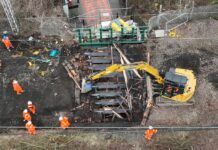
THE Scottish Government is to invest £358 million in the coming year to help more people install clean heating systems and increase the energy efficiency of homes.
The move was announced by finance secretary Shona Robison in the Scottish budget.
Other announcements included £66.9 million to kickstart a commitment of up to £500 million to anchor a new offshore wind supply chain in Scotland, and confirmation that the next phase of the A9 dualling programme will be progressed with the commencement of construction work on the Tomatin to Moy section.
The biggest announcement concerned a new income tax band. The Advanced rate band will apply a 45% tax rate on annual income between £75,000 and £125,140. Other changes include an additional 1p being added to the Top rate of tax and the Starter and Basic rate bands increasing in line with inflation.
Fiona Hodgson, chief executive of the Scottish and Northern Ireland Plumbing Employers Federation (SNIPEF), welcomed the home heating fund but expressed concern over the lack of skills to carry out the work.
“We applaud the Scottish Government’s ongoing commitment to home heating upgrades as a key measure in reducing our national carbon footprint,” she stated. “Nevertheless, the lack of focus on training and upskilling the necessary workforce for these upgrades is a significant concern.
“Our disappointment lies in the budget’s failure to address specific needs for apprenticeships and skill development funding, essential for both new and existing workers in our profession. This gap could potentially impede the effective execution of these critical heating upgrades, which are vital for meeting our energy efficiency targets.
“The role of the plumbing and heating profession is integral to the installation, maintenance, and upgrade of these systems. Therefore, investment in the professional development of our workforce is not just about skill enhancement; it’s crucial for the successful and efficient implementation of these sustainability initiatives.”
David Alexander, chief executive of property specialist DJ Alexander, described the budget as a ‘missed opportunity’ to address some of the issues affecting the housing sector.
He added, “There is to be a £550m investment in the supply programme for rent, social rent and affordable home ownership but given the scale of demand and the waiting list for social housing this, although a large amount of money, is still not sufficient to address the issue. In many local council areas, the wait for social housing is measured in years and sometimes in decades. This is an issue requiring sustained major investment over a prolonged period and the current announcement is welcome but clearly not going to meet demand in the next five to ten years.”
On the extra funding for energy efficiency measures, Mr Alexander added, “There is an additional £358m provided to accelerate the installation of clean heating systems but given that this represents just over 1% of the anticipated £33bn costs of the implementation of these energy efficient products it is clear that the homeowner is still being asked to stump up for the Scottish government’s green ambitions.
“With higher personal taxes than anywhere else in the UK and higher house purchase costs it is hard to see how these policies make Scotland an attractive place to live and work. This budget was an opportunity to encourage more housebuilding, to address serious shortages in the number of social housing available, and to attract higher earners to live and work here. Unfortunately, I think that it has been a missed opportunity on all counts.”








